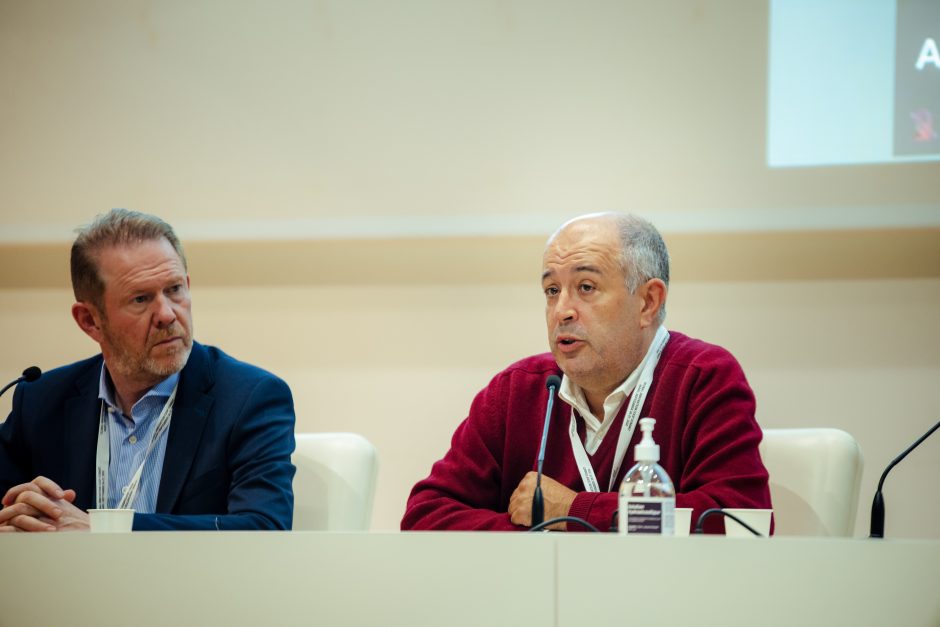With millennials set to comprise 75% of the workforce by 2025, last week’s Global Innovation Co-op Summit in Paris explored how co-ops can best attract and retain this generation.
Co-operatives already have an advantage when it comes to attracting millennials, according to Inmaculada Buendía Martínez, associate professor at the University of Castilla-La Mancha, Spain, whose research revealed that when presented with a matching, salary the age group chooses a co-op over another type of enterprise. Millennials who prefer to work in co-ops perceive them as democratic, just, transparent and socially responsible businesses, she said.
For Marc Duplantie, vice president, member relations and co-operative business development at Canadian insurer the Co-operators, the key to getting millennials on board is having them being part of building the strategy moving forward. Other important factors for him are trust, communication, promoting autonomy and putting the co-op principles in practice.
One of the biggest challenges in attracting millennials is a general lack of awareness around co-operatives. Conor O’Neill, community co-ordinator at UK retail co-op Midcounties, thinks co-ops should condense their message to reach young people. Putting communities at heart of a business will also attract young people, he said, but in itself will not take them away from other businesses that have better services and products, or is more efficient.
Good management is another key element to retaining employees: a recent Gallup poll of more than one million workers found that the main reason people quit their jobs is a bad boss, or immediate supervisor.
Anu Puusa, professor at the University of Eastern Finland Business School, who also sits on the boards of of Cooperatives Europe and Finland’s Pellervo Coop Center, said the word “boss” can have a different connotation when it refers to someone in a position of power who shares it. Being an effective leader cannot be based solely on rank, she argued: “Honesty, equality and emotional intelligence, openness are features we look for in a good manager.”
Guy Cormier, president and CEO of Desjardins Group in Canada, said communication is the biggest barrier to effective leadership. “You don’t have to be a good leader to be a boss,” he added, “but if you want to be a good boss you have to be a leader. When you’re a leader you’re laying out your vision, creating the environment. You remain an integral part of the team – they are giving you the legitimacy to achieve what you want to achieve.”
“Anyone can be a boss but not everyone can be a leader,” said Sylandi Brown, communications manager at the US Overseas Cooperative Development Council’s International Cooperative Research Group (OCDC). “The two are not interchangeable but they are not mutually exclusive either,” she added, warning that leaders need to value people development.
“Co-op values and principles need to be seen reflected in actions. Misalignment could be the reason millennials and Gen Z left their jobs,” she said.

Sébastien Chaillou-Gillette, executive director of the Chambre Régionale de l’Économie Sociale et Solidaire d’Île-de-France (CRESS) said a good leader can “help people give birth to their own ideas”. They also need to follow processes and listen to employees’ ideas before making decisions, he added, even when they have their own opinions about a certain matter.
The panellists agreed that co-op leaders need to be different from those of other enterprises. They must “recognise that there are different stakeholders and work with them”, said Chaillou-Gillette, while Puusa argued that co-op managers must remember their purpose beyond economic goals like maximising profit. With the co-op model “widely ignored in teaching” and “overlooked within mainstream management and economic theory”, boards must take care when hiring managers, to ensure they share the co-op’s values.
For Cormier, the difference lies not in organising teams, managing work or assessing performance, but in the mindset guiding the work. Co-op leaders have a long-term perspective, a set of values to follow and a democratic culture, he said.
Related: More reports from the Global Co-operative Innovation Summit
Brown added that leaders must address assumptions about marginalised groups and eliminate stereotypes that might affect their ability to see those people in senior roles.

Moving on to the subject of what keeps leaders going, Midcounties CEO Phil Phonsoby said that while co-ops compete against some of the largest corporates, they have a lot to learn from each other. “We spend a lot of money on consultancy and the answer is usually within the co-op,” he said.
The point was reiterated by Christine Bergeron, president and CEO of Vancity Credit Union in Canada. “When you lead to be inspired you’ll find your inspiration,” she said. “Sometimes you have to get out of the office and go into the branch and see how people help each other.”
Mirai Chatterjee, chair of India’s Self-Employed Women’s Association (SEWA) also highlighted the potential of co-operatives working together. In 2021 a group of UK co-ops provided over £100,000 to SEWA through Co-operatives UK’s International Working Group to help small women’s co-ops cope with the pandemic.
“We were able to help 15 women’s co-ops get up on their feet, and brought the experience to policymakers saying that small infusions of capital can help so much,” she said.
Doug O’Brien, CEO of US co-op apex NCBA-CLUSA, agreed on the need for co-ops to work together more. “Principle six is our super power,” he said, adding that NCBA is focused on working with co-ops to enable them to purchase from other co-ops.
Similarly, the history of the co-operative movement is what inspires Paulo Jorge Teixeira, president of Portugal’s Cooperativa do Povo Portuense, a social care co-op. Recent initiatives included a visit to the Rochdale Pioneers Museum in 2019, which inspired them to create a food co-op.

